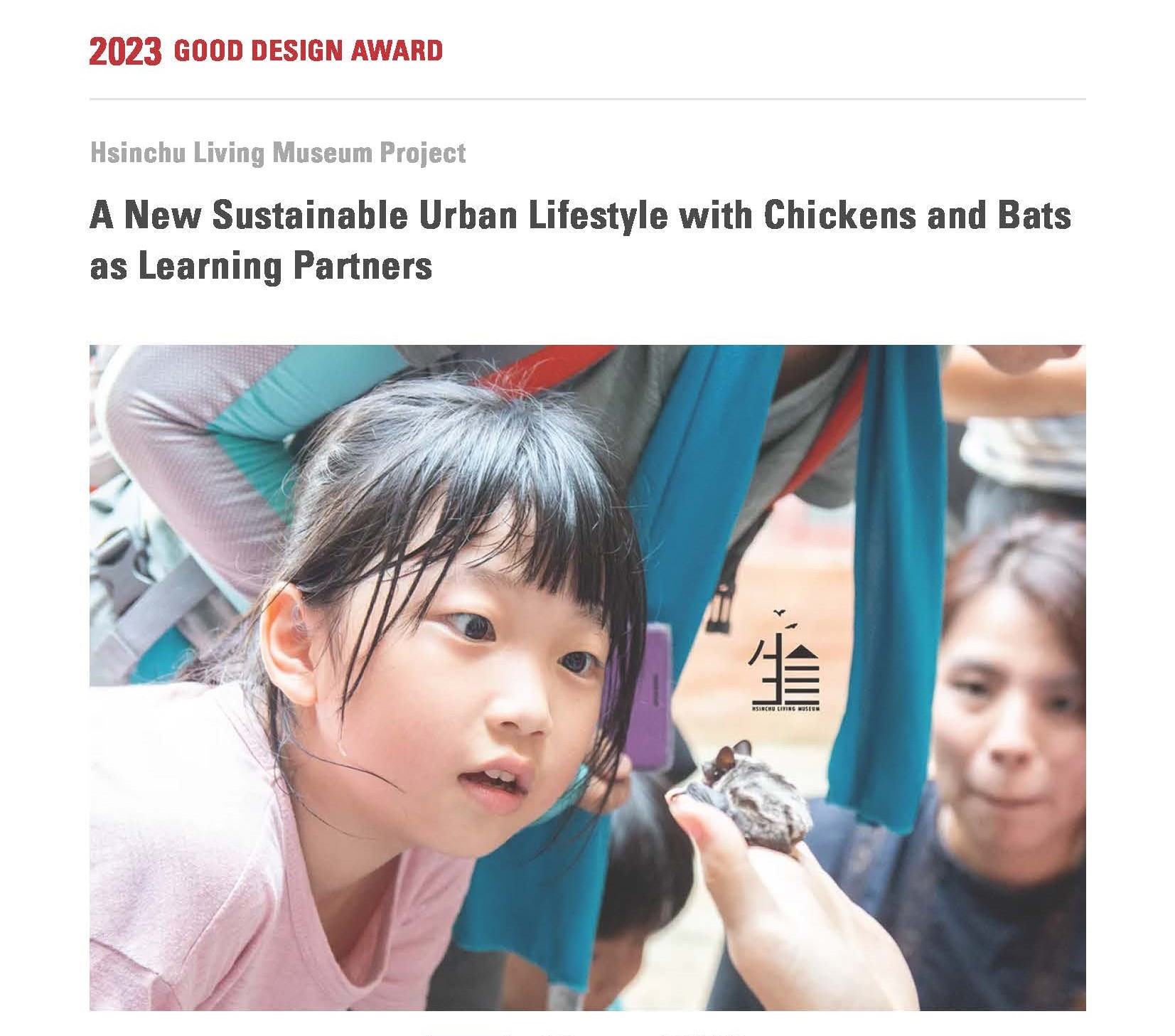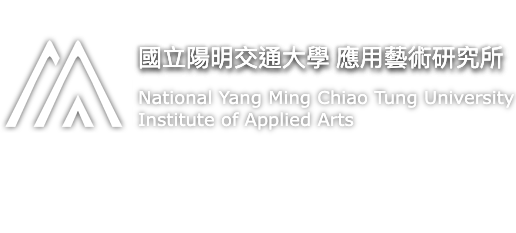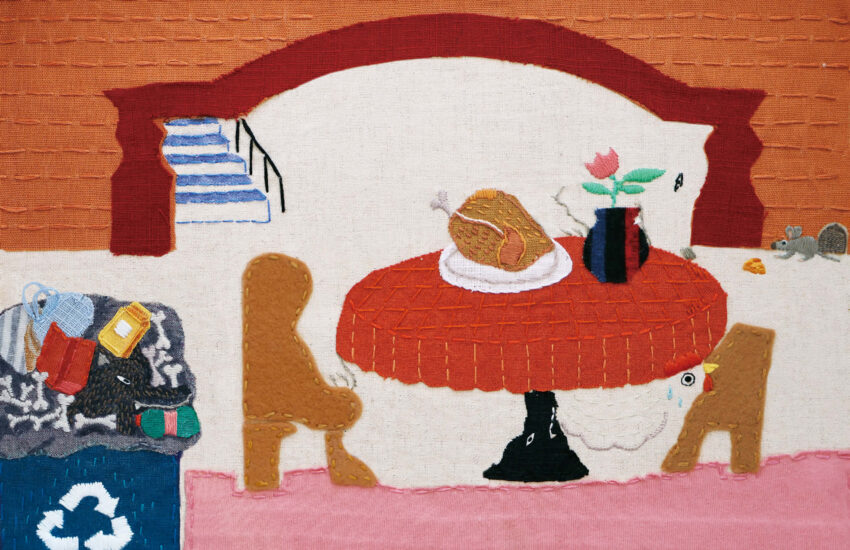
陽明交大六燃 新竹生博物館 團隊(簡稱六燃團隊)的「以雞和蝙蝠為學伴的永續都市新生活」在地實踐行動,自5月開始歷經三個階段的評審,從5447件報名作品中脫穎而出,榮獲GOOD DESIGN AWARD 2023!
由陽明交大應用藝術研究所賴雯淑教授帶領的六燃團隊深耕在地,推動永續發展,於2023年以「以雞和蝙蝠為學伴的永續都市新生活」榮獲日本優良設計獎(Good Design Awards)。團隊基於永續生活理念,將雞和蝙蝠視為學習夥伴,而不是人類管理的對象,以智慧科技、生態倫理的思考切入來照護雞舍與蝙蝠棲地,以more-than-human概念實踐永續生活、生態保育教育。對社區公益、公平優質教育有實質的貢獻,提供後人類與多元物種的另一種交織關係。
自2018年起,六燃團隊便透過實踐 SDG15 保育陸域生態、SDG11 永續城鄉、SDG17 多元夥伴關係、 SDG4 優質教育等四項聯合國永續發展目標,推廣與雞和蝙蝠作為共學夥伴,一起展開「永續都市新生活」。團隊固定於「霜毛蝙蝠」造訪「原日本第六海軍燃料廠新竹支廠」(大煙囪廠房保溫基地)的3-9月間舉辦霜毛蝠觀察家、霜毛蝠保母、霜毛蝠救傷、蝙蝠巢箱製作等系列工作坊,並進行蝙蝠觀測與數蝙蝠的活動。透過實際接觸,協助周遭居民與附近校園師生建立對蝙蝠的正確認知:「蝙蝠不但無害,甚至還能幫助環境的改善」,推廣對多元物種的理解與尊重。團隊並自2020年起於大煙囪廠房保溫基地內的眷舍遺構重現眷村時期的養雞生活,透過邀請社區大學學員共築雞舍、與社區居民共同養雞,凝聚地方共識與情感。雞舍成為了聯繫社區感情的中心,除了傳承不同世代的養雞記憶、建立尊重生命的觀念,團隊亦透過自產雞蛋、共享食材與營運社區食堂、培訓志工,來活絡社區人際網絡與凝聚地方共識。其中,保溫雞舍由於保溫基地整修,於2023年初搬遷至陽明交大光復校區繼續營運,並配合陽明交大的USR課程「參與式永續生活設計」,持續於校園與附近社區實踐永續理念。
評審評語:
The community design, which is based on the view that species of bats and chickens are not unilaterally controlled by humans but are learning partners in accordance with ethical principles based on permaculture philosophy, was highly praised. Programs such as using technology to care for chickens from a wellness perspective, such as smart poultry houses, and teaching that bats live intertwined with their environment all seem to promote a perspective beyond anthropocentrism that is called for at present. We hope that the university will continue to disseminate its activities both in the country and abroad and give an impact on museums and other natural and scientific communities.
A New Sustainable Urban Lifestyle with Chickens and Bats as Learning Partners
The NYCU Hsinchu Living Museum team has won GOOD DESIGN AWARD 2023. The team has been promoting a sustainable urban lifestyle in the philosophy of eco-friendly, sustainable ecology, respect for life, and fair share through ecological conservation education for the coexistence between the Asian parti-colored bats, chickens, and the local community since 2018 at the historical site of the former Imperial Japanese Navy’s Sixth Fuel Factory, Hsinchu Branch (The Big Chimney) and NYCU campus.
The Big Chimney brings together different ethnic groups and species as well as life experiences and memories of different periods, hence historical complexity and profundity. In 2020, the team pursues the following four SDGs to reconnect such a site with contemporary society and turn it into a place where people forge local identity and co-create new experiences and meanings.
The team engages community residents, students, and citizens in the vicinity. Applying the ethical principles in permaculture as its design philosophy, the project has three goals:
- maintaining the vitality of the earth and the natural system;
- fostering a symbiotic relationship between humanity and nature; and
- accepting limited resources and creating a balanced, reciprocal environment.
To march toward SDG 15 Life on Land, the team annually hold a series of workshops and bat observation events when Asian parti-colored bats visit the Big Chimney. The actual contact enables the residents, teachers, and students in the vicinity to understand that “bats can help improve the environment.” Thus, different species are treated with respect and sustainable coexistence is discussed. To actualize SDG 11 Sustainable Cities and Communities, and SDG 17 Partnerships for the Goals, the team seeks to forge local consensus and attachment by building the chicken coop in collaboration with the community college, and inviting community residents to raise chickens together. The chicken coop has become the center of community bonding thus restoring the lifestyle of community chicken raising. To promote SDG 4 Quality Education, courses like “Participatory Design for Sustainable Living” and “Slow Design for Mindfulness and Awareness” were offered for the students and the community. The team recycles rainwater to water the plants, collects cafeteria leftovers to feed the chickens, and offers the volunteers and the cafeteria the eggs laid by the chickens in return, so as to fulfill the idea of sustainability in the community.
The team established two monitoring systems. One is the real-time chicken coop monitoring system, which enables the researchers and volunteers to observe the behavior of chickens, and identify other species that intrude the coop, helping them better understand the local ecology. For students and community people, chickens are learning partners of human beings instead of economic animals. The participants learned the values of mutual help and sharing through building the chicken coop, understanding the habits and needs of chickens, and operating the coop together. The “chicken partners” can still enjoy their later years in the coop even if they no longer lay eggs. The other is the real-time bat monitoring system, which allows bat lovers to observe bats’ living situation in the chimney. Through the LINE group “Asian parti-colored bats at the Big Chimney,” the team shares bat knowledge and event information with the public. In addition, the bat boxes were made and hung to expand the bat habitat in response to rapid urban development.
The NYCU team aims to preserve and revitalize the Imperial Japanese Navy’s Sixth Fuel Factory Hsinchu Branch – a WWII industrial relic, a military dependents’ settlement, and a habitat for protected Asian parti-colored bats. Through community development, this place has become a hub for promoting new sustainable urban lifestyles, with chickens and bats as learning partners.





